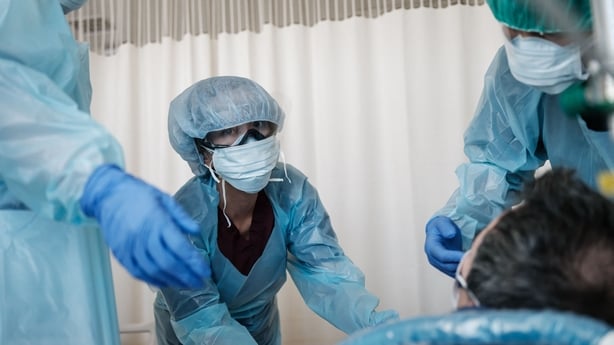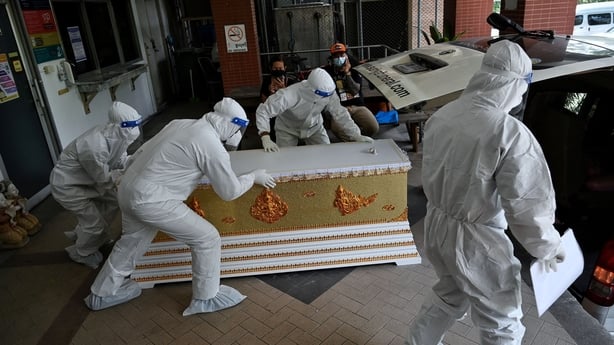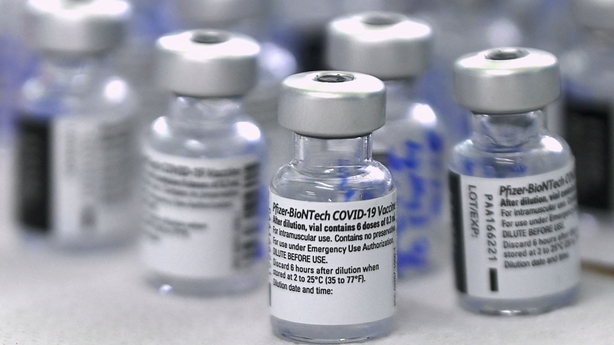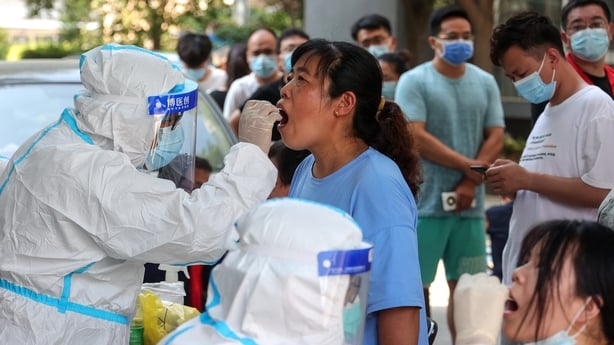France will offer Covid-boosted shots to the elderly and vulnerable from September, joining a growing list of countries offering third vaccines to fight novel viral variants.
«Yes, we may need a third dose, not for everyone right away but in any case for the elderly and the most vulnerable,» President Emmanuel Macron said in the latest series of explainer videos about his government’s vaccination strategy.
He confirmed that booster shots will be available from September.
Last month, he had already revealed plans for a boosted campaign, saying it would target those who were the first to get an injection earlier this year, mostly people over 80 or with serious health conditions.
Currently, the third vaccine shots are only available for people with weakened immune systems.
President Macron’s statement comes a day after the World Health Organization called on all countries to do so Stop booster shots Until the end of September at least to help alleviate the stark inequality in the distribution of doses between rich and poor countries.
«We need an urgent reversal, from the majority of vaccines going to high-income countries, to the majority going to low-income countries,» said WHO Director-General Tedros Adhanom Ghebreyesus.
Israel has already started giving booster doses to people over 60 and Germany said last week it would also start offering additional doses from September.
The French Ministry of Health said on Tuesday that the exact list of those who are eligible for a booster dose will be determined next week.
Japan expands Covid-19 measures as cases increase

Japan will expand its Covid-19 emergency restrictions to more than 70% of the population, as the surge in cases strains the medical system in Olympic host city Tokyo and elsewhere.
Coronavirus infections are increasing as new cases reach record levels in Tokyo.
Prime Minister Yoshihide Suga announced the new steps as the number of daily new cases in Tokyo is set to reach 5,000 for the first time and metropolitan advisers said the number could double in two weeks at the current rate, NHK public television reported.
«New infections are increasing at an unprecedented pace,» Economy Minister Yasutoshi Nishimura told a panel of experts, and suggested «semi-emergency» steps for eight other prefectures out of Japan’s 47 prefectures.
“The situation on the ground (in hospitals) is very serious,” Mr. Nishimura added, noting that serious cases had doubled in the past two weeks.
The committee signed off on the proposal, but Mr Nishimura told a news conference that some members had warned that the situation was serious enough to call for a nationwide emergency – a position shared by the president of the Japan Medical Association.
Six states, including Tokyo, are already in a full state of emergency that will last until August 31.
Another five are subject to less strict guidelines, which means more than half of the population is covered by some restrictions.
The latest steps, which will take effect from Sunday, mean that more than 70% of the population will be subject to some form of restrictions.
The government says the Olympics have not caused the recent surge, but experts say holding the games now has sent a conflicting message to an already exhausted public about the need to stay home.
Games organizers today reported 31 new gaming-related Covid-19 cases, bringing the total since July 1 to 353.
It remains to be seen whether the latter restrictions, which are mostly voluntary, will have as large an impact as the spread of a highly transmissible delta variable.
Just under 31% of Japan’s population has been fully vaccinated. With 15,221 deaths recorded as of yesterday, the Covid-19 death rate was around 1.6%, in line with the United States.
Thai mortuary workers battle fatigue as COVID cases rise
Mortuary workers in Thailand are battling burnout as the latest wave of Covid in the kingdom reaches new heights and the death toll rises.
The daily total of new cases crossed the 20,000 threshold for the first time yesterday, and the numbers crossed that day.
Authorities also announced another 160 deaths, bringing the total to 5,663 since the pandemic began.
At Thammasat University Hospital, north of Bangkok, staff had to rent a special container to store bodies after the morgue was full.

«It’s very stressful. We may not be exactly the frontline workers who have to deal with newly infected patients every day, but we are the end stage, and we have to help them in any way we can,» said forensic scientist Thanechit Khetkham.
«I’ve seen our employees faint a few times recently, so tiredness is definitely starting to set in and we’re almost at our limits.»
Every corpse arriving with Covid-19 must be scanned by mortuary staff, wearing head-to-toe protective suits, face masks and shields.
«We have the same number of staff as before the pandemic, but the work we do has tripled, so we’re sure we’re feeling stressed and stressed,» coroner Theplin Vengirapong said.
«If one of our employees gets sick, we’re going to have a big problem.»
The government has imposed severe restrictions on daily life in dozens of provinces, including Bangkok, as it struggles to contain the outbreak, which is fueled by the highly contagious delta type of virus.
Pfizer requires American workers to receive a COVID vaccine or regular tests
Pfizer will require all of its US employees and contractors to be vaccinated against Covid-19 or participate in a weekly virus test.
Pfizer spokeswoman Pamela Ezell said the company is taking the lead to «protect the health and safety of our colleagues and the communities we serve.»
Employees with medical conditions or religious objections can seek accommodations.
Outside the United States, Ezell said, Pfizer would strongly encourage employees who are able to vaccinate in their countries to do so.
At the end of 2020, Pfizer had approximately 29,400 employees in the United States.
With coronavirus cases in the United States rising sharply again due to a highly transmissible delta variant, companies like Alphabet and Walt Disney have begun setting up vaccine mandates for their employees.
As of Tuesday, 70.1% of adults in the United States had received at least one dose of the Covid-19 vaccine, according to data from the US Centers for Disease Control and Prevention.
Spain allows a maximum of 40% occupancy for outdoor sporting events in August
The Spanish Minister of Health said that in August, fans will be allowed to attend sporting events in Spain, with a maximum occupancy rate of 40% in open stadiums and 30% in indoor facilities, in a relief for clubs keen to restore a major source of income.
Health Secretary Carolina Daria told reporters that the cap will be in effect between August 13, when the Football League season begins, and the end of August, when central and regional governments will discuss the issue again, meaning the occupancy rate may vary.
Fans will need to maintain a distance of 1.5 meters between each other and wear a face mask. They will be allowed to drink water, but not to eat or smoke.
Entry and exit from facilities should be advanced and gradual, Ms. Dryas said, adding that indoor facilities need good ventilation.
Clubs will need to prioritize season-going members, as the government wants to avoid fans from distant teams from other regions traveling to attend events.
A maximum of 5,000 spectators were allowed last May to return to matches in the last two rounds of last football season in areas with low levels of Covid-19 infections, but that only benefited from very few matches.
Daria said Spain was in a «stabilizing phase» regarding the spread of Covid, with the 14-day infection rate of the Corona virus at 633 cases per 100,000 people, 20 fewer than the previous day and 70 cases less than last week.
Global Covid cases exceed 200 million as delta variable spread
Cases of Covid-19 worldwide have surpassed 200 million, according to a Reuters tally, with the most contagious delta variant threatening regions with low vaccination rates and strained healthcare systems.
The global increase in cases highlights the widening gap in vaccination rates between rich and poor countries. Cases are increasing in about a third of the world’s countries, many of which have not given half their population a first dose.
Meanwhile, GOAL’s Head of Monitoring, Evaluation and Learning described the WHO’s call to halt the use of Covid boosters until at least the end of September as «modest».
The move aims to enable the vaccination of at least 10% of each country’s population, Dr Tedros said.
Speaking on RTÉ’s Morning Ireland, Dr. Enida Friel said that for every 100 people in Africa, four people get a vaccine, while other countries have a figure of 88 per 100.
Dr. Friel said that while the US and EU partnered with COVAX to ensure vaccines were made available to poorer countries, when the EU and US issued their vaccine orders, they «price basically COVAX and lower-income countries.»
She said vaccine hesitation is also a problem in all countries in Africa and warned that the longer the delay in getting vaccines to these countries, the higher the hesitation.
Dr Friel said GOAL workers in Sudan are running campaigns to combat misinformation and similar work is being done across Rwanda, Malawi and Uganda.

«Lector profesional. Jugador galardonado. Aficionado a los zombis. Adicto a las redes sociales. Experto en tocino. Erudito en Internet»


